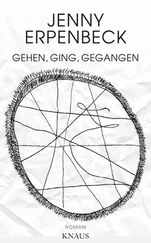Humor is when you laugh all the same, she says on one of those summer evenings during one of the last twenty years while she is sucking the marrow out of one of the claws, one of their friends, a film director, has just told everyone what a hard time the make-up department has been having making Aryan actors look Semitic so they can play that irksome racketeer Ipplmeier and his vassals. But in the rushes, at least, they looked like the real thing, the director says, heaving a sigh, and her husband says: Hope springs eternal, and she says: Humor is when you laugh all the same. Humor is when you laugh all the same, she says on some other summer evening during a different one of the last twenty years, and she cracks the shell of a crab as her husband is telling friends that he must travel to the West and use his own private funds to buy screws for the young republic because it has been expressly demanded of him that he stay within the allotted budget while also completing the building he’s now working on in time for the third anniversary. In the entire Eastern Zone there are no screws to be had, unbelievable, he says, and she says: Humor is when you laugh all the same. On some summer evening during one of the last twenty years her husband tells one of the guests how at the end of the war the Russians had converted the garden to a paddock for their horses, how everything had been trampled, how he had even seen the gardener cry, he says all these things, and his wife says nothing, she is just wiping her hands on a napkin, and their friend, who after all can only judge what has been said to him, now makes his contribution to the subject by repeating in his turn: Humor is when you laugh all the same, and while he is saying this, he fishes another crab out of the pot. If it had not been for that one night, that one night in the walk-in closet that her husband had designed especially for her, she might perhaps still believe that when her husband slid the contract of sale over to her to sign he was buying her a piece of eternity and that this eternity did not have a single hole in it anywhere.
Even today when she hears someone speak of the war she thinks first of the war that her own body began to wage against her just as the first bombs fell on Germany. Despite the shrinking supplies of food, her body had, utterly illogically, grown fat all at once while others who had been fat beforehand, her sisters for example, first grew slender with all the excitement and then the hunger, and then they grew thin and then haggard. The 6th Army capitulated outside of Stalingrad, and already the morning of that day she was overcome by hot flashes, the sweat covered the space between her lips and nose like a moustache of tiny droplets, this sweat was embarrassing, but it would have embarrassed her even more to wipe it away, the Russians were marching toward Poland, and she felt dizzy, often several times a day, so that she had to steady herself by grasping table edges and door handles so as not to fall down, and finally, just as the Allies were landing in Normandy, even weeping returned to her body, taking hold of it and refusing to leave again, like a long-forgotten creditor come to collect on a debt she no longer recalled. She who had always cut such a boyish figure now stood there every morning before the mirror sweating, she steadied herself on the edge of the sink so as not to fall down, she wiped her tears, avoiding the sight of that round, milky face with which she shared no memories; compared to this face the colored glass in the windows to the right and left of the mirror looked so much more familiar — glass that her husband had put there just because she wanted him to.
She was feeling so poorly during this period that she’d had to ask one of her nieces to come stay with her to help out around the house while her husband was closing down his office in Berlin, packing up the construction plans and organizing a fireproof hiding place for his documents. How good it was that the telephone sat so close beside her bed in its niche, for now she generally kept to her bed even during the day. As she held the receiver to her ear, listening to her husband tell her who had been buried in the rubble, which building had collapsed and how crowded it was down in the cellar, she gazed at the colorful feathers of the little bird that sat forged to her balcony railing, and behind the bird the leafless branches of the trees, and through the branches of the trees the Märkisches Meer glittering. Only after the battle at Seelower Höhen had she sent her niece to stay with relatives in the West to shield her from an encounter with the Slavic hordes, while she herself took refuge behind the double door of the walk-in closet with the last of the provisions and a bit of water. And then the Russian came.
She doesn’t want to think that word, that word he called her, that unthinkable word with which he drilled a hole in her eternity for all eternity. Her body, already infertile by then, had drawn him to her — this man who knew the word that robbed her of all strength — had drawn him violently to her and for the length of time a birth might take had smothered the laughter that had stood in her body’s way all this time, and during this night in the hidden closet that her husband had built specially for her, because back when she was still a circus princess she had wanted him to, she had finally joined forces with the enemy. Only after the capital had fallen was her husband able to return to her, and what he found was a trampled garden and a gardener weeping at the devastation. His wife shared with him the half loaf of bread the Russian had left for her.
Have you heard this one? A musician is on tour. His very pregnant wife is supposed to let him know when their child is finally born. Their code word is to be: cantaloupe. So the musician is sitting on stage playing. And now one evening a colleague whispers to him from the wings: cantaloupe, cantaloupe, cantaloupe — two with stems, the other, nope! There are things you can’t help laughing at every time. This joke is always a success, everyone always laughs, the architect always laughs, and his wife laughs too, even though she’s the one who told the joke, and their guests also laugh. Musician on tour, cantaloupe, nope. Around fifteen years ago, the actor Liedtke, who was married to an operetta diva and lived at the end of the sandy road, had done her one better and, using his hands to suggest ample breasts, had quoted from The Merry Widow : On account of my melons — um, millions! Musician on tour, cantaloupe, nope; it even worked during the war when the coffee and tea importer from next door told them that the butcher’s daughter had just given birth to twins even though her husband hadn’t been on furlough from the Eastern front in over a year. Musician on tour, cantaloupe, nope, the architect’s wife says today to the director of the State Combine for Automobile Tires, a friend of her husband’s, once the laughter has died down: You know, I found it utterly outrageous for Hitler to demand that we women bear children for the state — we aren’t machines. And her husband says: In her own way, my wife was practically in the Resistance. The director of the State Combine for Automobile Tires laughs, and the architect laughs, and his wife laughs as well.
All the while, for nearly six years now, time has been draining away through that hole the Russian drilled in her eternity near the end of the war. Only because times are hard has something like a historical moment of inertia set in, only because times are so hard that time has trouble even just running away — it’s having to take its time — does the architect’s wife still sit there on her terrace six years after the war, sit there with a pot filled with crabs boiled till they are red, serving up her guaranteed punch lines to her friends, laughing herself harder than anyone, and gazing out over the lake that has meanwhile become state property. Time is draining away as the architect’s wife, on her husband’s arm, accompanies her guests down to the gate and waves after them in the dark, draining away as the couple goes back inside again, as they stack up the plates covered in crab shells and carry them into the kitchen, as she says to him that she’s tired already, and he says he wants to smoke one last cigarette outside, as she walks up the stairs, undresses in her room, puts on the silk robe and goes into the bathroom, the colored glass panes in the windows to the right and left of the mirror are even blacker than other glass at nighttime, draining away as the woman sits down on the edge of her bed to rub her legs with camphor oil and her chest with peppermint salve, draining away as she calls out “good night” through the half-open balcony door to her husband, who is smoking one last cigarette down on the terrace, draining away and away as she hangs the cream-colored silk robe back on its hook in the shallow part of the walk-in closet, away and away as she lies down and falls asleep. Away. Soon she will be living in a one-bedroom apartment in West Berlin, and later in a retirement home near Bahnhof Zoo. From her escape to the West until the end of her life, she will always keep everything one might urgently need in an emergency on hand in her purse, things such as paper clips, rubber bands, stamps, scraps of paper to write on and pencils. And in her testament she will leave the property beside the lake and the house that unto all eternity will smell of camphor and peppermint — that house that in purely legalistic terms still belongs to her even though it is located in a country she may no longer set foot in without risking arrest — to her nieces and the wives of her nephews. But not to any man.
Читать дальше












